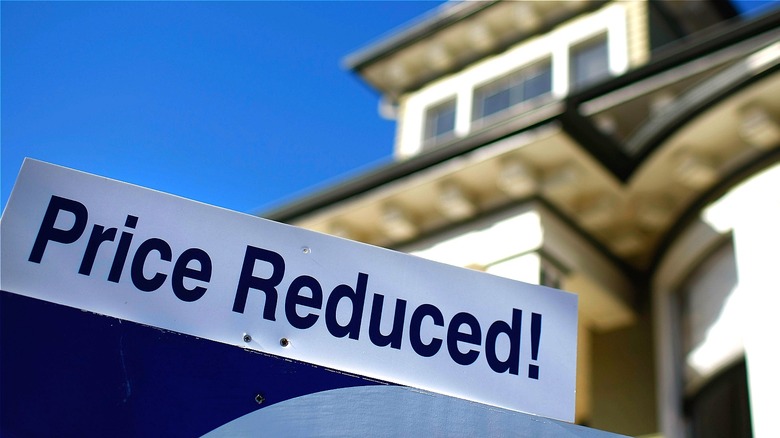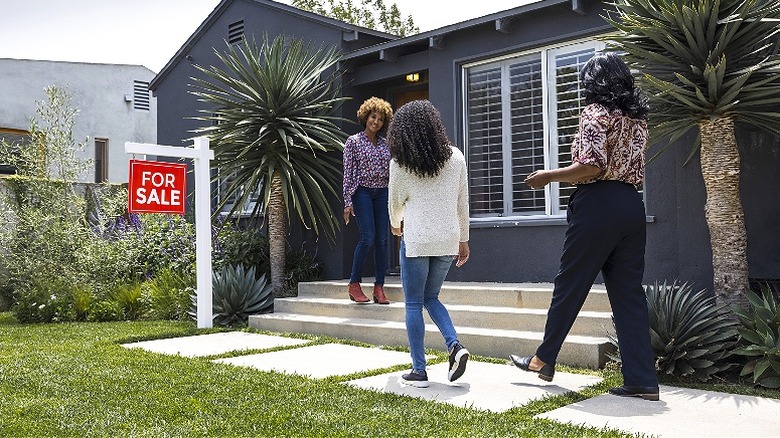When Should You Start Lowering The Price Of Your Home To Sell It Faster?
There's no doubt that the value of existing homes in the country has remained stubbornly resilient. Even in the face of much higher mortgage rates than in prior years, U.S. home prices have continued to rise, hitting record high after record high. That said, it's still possible to get a little overzealous and wind up overpricing your home. An overpriced home will have fewer showings — that is, buyers coming to tour the home — and take longer to sell, if at all.
If you're working with a listing agent, they'll look at comparable recent home sales to determine a recommended asking price for your home. Still, determining an asking price is not an exact science and also some sellers will insist on pricing their homes above their agent's recommendation.
If you suspect you or your agent are guilty of overpricing, it's best to lower the price of your home quickly. Homes get the most attention from buyers immediately after being listed, so you won't want to delay adjusting your price at the first indications of an overvalued situation. We will explain how to detect trouble and what to do.
Internet and in-person traffic is king
As previously mentioned, if your property isn't attracting buyers for an in-person viewing, a too-high price could be to blame. Other telltales to watch for include a low level of interest online. For example, few potential buyers saving your listing as a favorite on sites like Zillow. Finally, your home might be receiving a respectable amount of attention, but with no offers to purchase. Although it's true buyers are free to make an offer for significantly less than the asking price, some will be reluctant to do so for fear of wasting time or offending the sellers.
However, before lowering your asking price (and your net proceeds), make sure everything else about your home listing is up to snuff. Regardless of how attractive your home is in-person, double check that the online photographs are sufficient in both number and quality to impress potential buyers. Besides professional-quality photos, also consider creating a virtual tour video of your property.
Another consideration: Make sure your listing is receiving maximum exposure. Your agent will almost surely market your home in your local Multiple Listing Service, but also consider some less conventional venues, like Facebook Marketplace. Finally, some times of the year are better than others for selling your home — a fact that's worth researching.
You might have to make more than one reduction
It's no secret that newly listed properties will receive the most showings and the most open-house attendees. Therefore, if your property seems to be falling short, lower your price sooner than later, before the newness wears off. That said, expert opinions vary about the exact time at which a price reduction should be considered. Some aggressive real estate agents recommend reevaluating your pricing after just 10 days without a viable offer, while others caution not to exceed 30 days on the market without a price reduction. That leaves a happy medium of about three weeks to adjust your price lower if activity and/or offers are sluggish.
As far as the magnitude of price reductions when selling a home, a range of 3% to 7% is popular among experts. Also, pay attention to incremental price levels. For example, you wouldn't want to reduce your asking price to $501,000 when you could ask for a more appealing $499,000 instead. Nobody likes to lower their asking price and forgo potential profits, but the stark reality is that one price reduction alone might not attract a buyer. On the other hand, you don't want to get too carried away with excessive price reductions, lest buyers will think you're desperate or there's something wrong with your property.
Nationally, the average time it takes for a home to go under contract as of July 2024 is ~50 days. However, your particular geographical area could take more or less time. Therefore, it is always best to consult with a knowledgeable local agent about what's considered normal before slashing your asking price.


